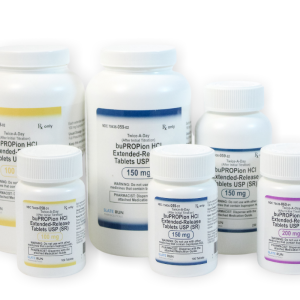Clindamycin Tablets
Clindamycin is an antibiotic medication primarily used to treat bacterial infections. It belongs to the lincosamide class of antibiotics and works by inhibiting the growth of bacteria.
Here’s an overview of its uses, side effects, and warnings:
Uses:
- Bacterial Infections: Clindamycin is used to treat a wide range of bacterial infections caused by susceptible organisms. These infections may include:
- Skin and soft tissue infections, such as cellulitis, abscesses, and wound infections.
- Respiratory tract infections, such as pneumonia and lung abscesses.
- Intra-abdominal infections, such as peritonitis and abscesses.
- Bone and joint infections.
- Dental infections.
- Pelvic inflammatory disease (PID) in women.
- Certain sexually transmitted infections, such as chlamydia,.
Side Effects:
- Gastrointestinal Effects: Common side effects of clindamycin include nausea, vomiting, diarrhea, and abdominal pain. Diarrhea may be severe and potentially lead to pseudomembranous colitis, a serious condition caused by the overgrowth of Clostridium difficile bacteria in the colon. This can occur during treatment or even weeks to months after treatment has stopped.
- Allergic Reactions: Allergic reactions to clindamycin are rare but can occur. Symptoms may include rash, itching, swelling, severe dizziness, or difficulty breathing. Seek medical attention immediately if you experience any signs of an allergic reaction.
- Other Side Effects: Other possible side effects of clindamycin may include:
- Rash or itching
- Vaginal yeast infections (in women)
- Changes in taste
- Joint pain
- Yellowing of the skin or eyes (jaundice)
- Dark urine
- Unusual tiredness
Warnings:
- Clostridium difficile-associated diarrhea (CDAD): Clindamycin use can increase the risk of developing CDAD, a severe form of diarrhea that can lead to colitis. It’s important to be aware of the symptoms of CDAD, such as severe or persistent diarrhea, abdominal pain, and fever, and to seek medical attention if they occur.
- Allergic Reactions: Some individuals may be allergic to clindamycin or other antibiotics. If you have a history of allergies to antibiotics, be sure to inform your healthcare provider before taking clindamycin.
- Liver Function: Clindamycin may affect liver function, especially with prolonged use or in individuals with pre-existing liver conditions. Liver function tests may be performed periodically during treatment to monitor for any abnormalities.
- Pregnancy and Breastfeeding: Clindamycin is generally considered safe to use during pregnancy and breastfeeding when necessary, but it’s essential to discuss the risks and benefits with your healthcare provider before taking the medication.
- Resistance: Like all antibiotics, the overuse or misuse of clindamycin can lead to the development of bacterial resistance, making future infections more difficult to treat.
It’s crucial to take clindamycin exactly as prescribed by your healthcare provider and to complete the full course of treatment, even if you start to feel better before the medication is finished. If you experience any concerning side effects or symptoms while taking clindamycin, be sure to contact your healthcare provider for guidance.

| Amount | 100 pills, 30 pills, 60 pills |
|---|
Reviews
There are no reviews yet.
Related products
Sale!
Pills
Hallucinogens
$300.00 – $700.00
Pills
$50.00 – $150.00
Pills
$450.00 – $2,600.00
Pills
$80.00 – $380.00
Pills
$50.00 – $150.00
Pills
$100.00 – $230.00
Pills
$220.00 – $1,400.00













Be the first to review “Clindamycin Tablets”